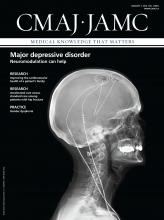News that emergency contraceptive pills containing levonorgestrel may not prevent pregnancy in women who weigh 165 pounds or more is raising questions about the formulation’s initial clinical trials and the lag in making this information available to women.
The emergency contraceptive formulation of levonorgestrel, marketed as Plan B in Canada, has been approved for sale in Canada since February 2000 without warnings on its product monograph about the medication’s effectiveness relative to weight.
A 2011 meta-analysis concluded that women who take levonorgestrel for emergency contraception, and have a body mass index (BMI) that deems them obese, have a three times greater risk of pregnancy than women with a normal BMI (Contraception 2011;84:363–7).
Since then, HRA Pharma, the European manufacturer of the emergency contraceptive, has re-examined its data and is changing the labelling on its Norlevo brand of levonorgestrel to warn that it is less effective for women who weigh 165 pounds or more, regardless of BMI.
That is vital information that should have been made available to Health Canada — and to Canadian women — long before now, says Anne Rochon Ford, executive director of the Canadian Women’s Health Network.
“I’m really stunned that it’s been on the market for so long and we’re just finding out now,” says Rochon Ford. “Who were they studying it on in the clinical trials? It just raises so many red flags about how clinical trials are done.”
Many women weigh 165 pounds or more, which implies that the “morning-after” pill was not tested on a variety of body types, Rochon Ford suggests. In the United States, for example, 165 pounds is considered an average weight for women.

In Canada, the emergency contraceptive formulation of levonorgestrel is sold as Plan B and its labelling does not indicate that efficacy is related to body weight.
Image courtesy of Laura Eggertson
“This is a classic case of ‘You’re still a guinea pig when the drug is already out on the market,’” Rochon Ford adds.
In Canada, Teva Pharmaceuticals manufactures the emergency contraceptive formulation of levonorgestrel and sells it as Plan B, but the drug contains the same active ingredient at the same dosage as the European version.
That gives Canadian women cause for concern if they are considering using Plan B as emergency contraception but weigh 165 pounds or more, says Barbara Mintzes, an assistant professor in the University of British Columbia’s Department of Anesthesiology, Pharmacology and Therapeutics. “There’s no reason to think that the warnings in the European Union would be less applicable here,” says Mintzes. “It certainly begs the question about why, in countries where Plan B has been approved, there hasn’t been a review and a warning about use by women who are obese.”
Health Canada is aware of the label change in Europe, says Leslie Meerburg, a Health Canada media relations advisor. The regulator has not yet provided advice to Canadian women or health professionals on the matter. “Health Canada is assessing the available data on the effectiveness of this product, and will take appropriate action if required, such as working with the manufacturer to update the product labelling and notifying health care professionals and consumers of this change.”
The US Food and Drug (FDA) Administration is also reviewing the scientific information about the emergency contraceptive formulation of levonorgestrel, Erica Jefferson, FDA deputy director of media affairs, writes in an email. “The agency will then determine what, if any, labeling changes to approved emergency contraceptives are warranted.” The emergency contraceptive’s original product approval did not contain any specific assessment related to weight, Jefferson wrote.
Paladin Labs, which distributes Plan B in Canada, has not yet seen HRA Pharma’s initial data, and so cannot comment on it, says Patrice Larose, vice-president of scientific affairs for Paladin. “I’m sure that authorities that have the data will look at it, and if they think there are any labelling changes that are needed, we will discuss it.”
Companies are required to provide Health Canada and other regulators with periodic safety and efficacy updates, including any new information about their drug, says Mintzes. It’s also possible that there were some indications in early premarket trials that the morning-after pill was less effective for heavier women, says Mintzes. But the only way for consumers and health professionals to know what Health Canada knows is to make the data publicly available, she adds. “It’s another example of why we should have full public access to all of the effectiveness and safety data before a drug is marketed.”











